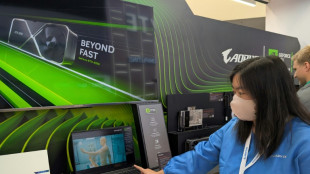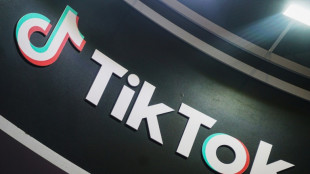
-
 Stock markets drift lower as US jobs data looms
Stock markets drift lower as US jobs data looms
-
Pakistan flight departs for Paris after EU ban lifted

-
 Nobel laureate Malala Yousafzai to visit native Pakistan for girls' summit
Nobel laureate Malala Yousafzai to visit native Pakistan for girls' summit
-
AI comes down from the cloud as chips get smarter

-
 Tajikistan bets on giant dam to solve electricity crisis
Tajikistan bets on giant dam to solve electricity crisis
-
Uruguay bucks 2024 global warming trend

-
 Last 2 years crossed 1.5C global warming limit: EU monitor
Last 2 years crossed 1.5C global warming limit: EU monitor
-
Japan 'poop master' gives back to nature

-
 US Supreme Court to hear TikTok ban case
US Supreme Court to hear TikTok ban case
-
US Fed's December rate cut should be its last for now: official

-
 Paris Hilton among celebrities to lose homes in LA fires
Paris Hilton among celebrities to lose homes in LA fires
-
Airbus boosts plane deliveries in 2024

-
 Ubisoft reviews restructuring options, postpones new Assassin's Creed
Ubisoft reviews restructuring options, postpones new Assassin's Creed
-
Lamborghini sets new sales record amidst hybrid push

-
 Lebanon army chief Aoun becomes president after two-year vacancy
Lebanon army chief Aoun becomes president after two-year vacancy
-
US emissions stagnated in 2024, challenging climate goals: study

-
 Lebanon army chief short of required majority in first round of president vote
Lebanon army chief short of required majority in first round of president vote
-
Global stock markets mixed tracking US rates outlook

-
 Lebanon meets to finally elect president after two-year vacancy
Lebanon meets to finally elect president after two-year vacancy
-
Celebrities flee Los Angeles fires, lose houses as Hollywood events scrapped

-
 Japan startup hopeful ahead of second moon launch
Japan startup hopeful ahead of second moon launch
-
Ukraine allies to hold last defence meet before Trump takes office

-
 Myanmar military adopts anti-junta fighters' drone tactics
Myanmar military adopts anti-junta fighters' drone tactics
-
CES tech looks to help world's aging population

-
 Rubber tappers forge sustainable future in Amazon
Rubber tappers forge sustainable future in Amazon
-
US astronauts upbeat seven months into eight-day mission

-
 Extreme weather, suburban sprawl fuel LA's wildfires
Extreme weather, suburban sprawl fuel LA's wildfires
-
Political chess or true beliefs? Zuckerberg's surprise Trump pivot

-
 US Fed officials concerned over 'stalled' disinflation, tariffs: minutes
US Fed officials concerned over 'stalled' disinflation, tariffs: minutes
-
Celebrities flee Los Angeles fires as Hollywood events scrapped

-
 Several US Fed officials concerned over 'stalled' disinflation: minutes
Several US Fed officials concerned over 'stalled' disinflation: minutes
-
US tech titans ramp up pressure on EU

-
 'Wicked' tops SAG Awards nominations
'Wicked' tops SAG Awards nominations
-
Safe from looting, Damascus museum reopens a month after Assad's fall

-
 Award-winning migrant actor earns visa to stay in France -- as a mechanic
Award-winning migrant actor earns visa to stay in France -- as a mechanic
-
Celebrities forced to flee Los Angeles blazes

-
 US tariff and inflation fears rattle global markets
US tariff and inflation fears rattle global markets
-
US private sector hiring undershoots expectations: ADP

-
 US tariffs unlikely to have 'significant' inflation impact: Fed official
US tariffs unlikely to have 'significant' inflation impact: Fed official
-
Lebanon leaders in talks for new bid to elect president

-
 Antarctic sea ice rebounds from record lows: US scientists
Antarctic sea ice rebounds from record lows: US scientists
-
Can EU stand up to belligerent Big Tech in new Trump era?

-
 US, Canadian and Australian travellers now face UK entry fee
US, Canadian and Australian travellers now face UK entry fee
-
Indonesia upholds iPhone 16 sales ban after Apple offers $1 bn investment

-
 UK's Catherine turns 43 hoping for better year
UK's Catherine turns 43 hoping for better year
-
OpenAI chief Sam Altman denies sister's sexual abuse accusations

-
 Germans turn to balcony solar panels to save money
Germans turn to balcony solar panels to save money
-
Samsung warns fourth-quarter profit to miss forecasts

-
 Brazil gears up for first climate conference in Amazon
Brazil gears up for first climate conference in Amazon
-
Iraqi archaeologists piece together ancient treasures ravaged by IS


As AI gets real, slow and steady wins the race
In the wake of ChatGPT's dramatic arrival two years ago, companies are excited about generative AI's possibilities but heading into 2025 with careful deliberation rather than rushing to transform their operations.
The Channel Tunnel, one of the world's most strained travel checkpoints, presents a compelling example of AI's current limitations and practical applications.
Each day, 400 of the world's largest locomotives cross the tunnel linking France and Britain, with nearly 11 million rail passengers and 2 million cars carried through annually.
For GetLink, the company managing the 800-meter-long trains, caution around AI implementation remains paramount.
"We're in a highly regulated business. We're not kidding around. These are very strict procedures," explained Denis Coutrot, GetLink's Chief Data and AI officer.
Rather than controlling train operations, their AI primarily handles more mundane tasks like searching through rules and regulations.
The legal sector, initially viewed as prime for AI disruption, tells a similar story.
"ChatGPT is obviously incredible. But it's really quite hard to apply it in your day-to-day workflows in a way that is impactful," noted James Sutton, founder and CEO of Avantia Law.
- 'Verify everything' -
While AI excels at basic tasks like searching legal databases and generating simple summaries, more complex work requires careful human oversight.
Sutton explained that AI's inconsistency remains a challenge: "One contract I can put in and the AI kicks it out perfectly. Another one will be 40 percent right. That lack of certainty means lawyers still have to verify everything."
The tech industry presents a more aggressive adoption curve.
Google reports that 25 percent of its coding is now handled by generative AI.
JetBrains CEO Kirill Skrygan predicts that by next year, AI will handle about 75-80 percent of all coding tasks.
"Developers are using AI as assistants to generate code, and these numbers are growing every day," said Skrygan at the Web Summit in Lisbon.
"The next level is coding agents that can resolve entire tasks usually assigned to developers."
He suggested that over time, these agents could replace virtually all of the world's millions of developers.
Visual design industries, particularly fashion, are seeing significant impact from AI image generators like DALL-E, Midjourney, and Stable Diffusion.
These tools are already transforming work habits and shortening time-to-market for new collections.
In healthcare, despite a study showing AI's potential —including one where ChatGPT outperformed human doctors in diagnosis from case histories — practitioners remain hesitant to fully embrace the technology.
"They didn’t listen to AI when AI told them things they didn’t agree with," Dr. Adam Rodman, who carried out the study, told the New York Times.
- 'Very concerned' -
Companies face a complex calculation between innovation, prudence and how much they are willing to spend.
"It will take some time for the market to sort out all of these costs and benefits, especially in an environment where companies are already feeling hesitation around technology investments," observed Seth Robinson, VP for industry research at CompTIA.
Anant Bhardwaj, CEO of Instabase, believed that AI's limitations were real but temporary.
"The real new innovation, like new physics or new ways of space exploration, those are still beyond the reach of AI... If people think that AI can solve every single human problem, the answer today is 'No.'"
While AI excels at processing existing patterns and data, Bhardwaj argued it lacks the human curiosity needed to explore truly new frontiers.
But he predicted that within the next decade, most industries will have some form of AI-driven operations, with humans in the backseat, but complete AI autonomy remains distant.
Still, the disruption caused by AI is coming hard and fast, and countries must be prepared.
"White collar process work is hugely impacted, that's already happening. Call centers is already happening," Professor Susan Athey of Stanford University told a statistics conference at the IMF.
Athey, an economist of the tech industry, expressed worry about regions where a core profession such as call centers risked being swept away by AI.
"Those are ones I would really watch very carefully. Any country that specializes in call centers, I'm very concerned about that country," she said.
H.Meyer--CPN
